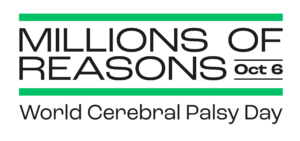Dit is CP: Building CP Awareness in the Netherlands
Every 22 hours, a baby is born with cerebral palsy in the Netherlands. Approximately 50 per cent of all children in the Dutch pediatric rehabilitation system have cerebral palsy.
This project was a World Cerebral Palsy Day Merit Award winner in 2017. Enter your project or campaign in the 2018 Awards!
However, if you ask any person on the street what cerebral palsy is, they will tell you that they don’t know. There was a huge lack of information and acceptance surrounding cerebral palsy in the Netherlands and it was time to make a change.
And so, the team from BOSK (an association in the Netherlands for people with a disability) set that change in motion.
Working with a variety of public relations companies, a 3-year campaign was established to educate the broader community about cerebral palsy, and make moves to reduce prejudices towards people living with the condition.
“All too often people with cerebral palsy are being seen as also having a mental disability,” says Johannes Verheijden, Governance Coordinator Care from BOSK. “Friends and family of people with the condition are being asked what the person wants to drink, buses don’t stop for them, and people on the street will gaze but not speak directly to the person in question.”
“Families are feeling alone and unsupported by society. We wanted that there would be no need for people to explain what cerebral palsy was at birthday parties anymore,” he says. “We wanted guests and table companions to know what cerebral palsy is because they’ve seen the confronting and triggering videos, the social media or some other element of our campaign.”
How did the campaign work?
The campaign had 3 distinct goals over the 3 years:
- Year 1: To acquaint the general public with the term ‘CP’ as the abbreviation for cerebral palsy
- Year 2: Explain cerebral palsy
- Year 3: Give people with cerebral palsy the opportunity to influence the campaign by sharing their story and the condition’s impact on their lives.
The campaign includes a fit-for-purpose website, campaign video, 4 short movies, a YouTube page, Twitter campaign, and Facebook advertising campaign; all designed to meet the above-mentioned goals.
At the heart of all the materials, were 5 adults and 1 parent of a child living with cerebral palsy.
“Our participants came to us through our own network of people with cerebral palsy, as well as via an open call-out on Facebook,” says Johannes. “It resulted in a number of parents, adolescents and adults talking to us during a focus group session, from which a few of them agreed to volunteer in short documentaries.
“An in-house filming company gave them some training and then the participants filmed the highlights of their lives for two-weeks. When they were done, a professional company edited them into the four short movies for our campaign,” he says.
What were the results?
Johannes expresses great excitement when asked whether the campaign results met expectations.
“Very much!” he exclaims. “The responses we received from complete strangers were overwhelmingly warmhearted.”
“Families with a child with cerebral palsy, and adults with cerebral palsy, mentioned that friends, family members, colleagues and acquaintances spontaneously responded to them, telling them that they never realized what an impact cerebral palsy has on daily life,” he says.
The actual participants – campaign stars as it were – were also very happy with the results.
“They received a lot of response to the campaign. One parent was even approached by a national magazine in which she featured,” Johannes says.
“The campaign made them feel significant, appreciated and seen. It gave them a boost to their self-esteem.”
Here are the numbers
(12 December 2016 – 28 February 2017)
Campaign specific page
- 944,849 people reached
- 2,615184 views
- 1,112 shares
- 7,105 responses made up of:
– people who were tagging friends or parents with cerebral palsy
– asking for information about cerebral palsy
– asking for information relating to cerebral palsy and pregnancy.
BOSK page
- Increase of 538 followers
- 205 new likes resulting from campaign ads
Website
- 69,652 visitors during the campaign period of which 59,764 were unique visitors
- 61,565 visitors came via Facebook
- 78 per cent were female visitors versus 22 per cent that were male
YouTube
- 22,953 views of all five videos (campaign video and four short videos)
To view the website and campaign materials, visit www.ditiscp.nl


